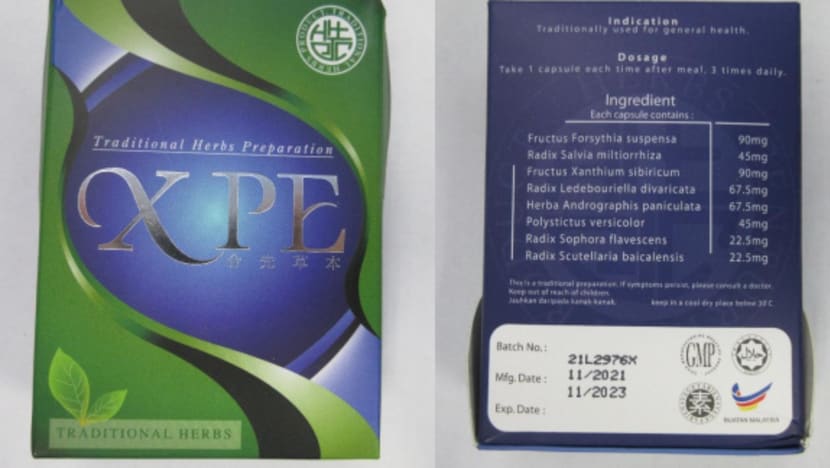Clever packaging, promises of quick results: Why people turn to dubious pills for pain relief and weight loss

An array of pills. (Photo: iStock)
SINGAPORE: Rheumatology specialist Dr Cho Jiacai’s patient was taking a “herbal” product that seemed very effective in reducing her joint pains. But something about it set off alarm bells in the doctor’s head.
The patient, a woman in her 60s, was not able to reduce the dosage as the joint pains would promptly recur when she did so, said Dr Cho, a consultant at National University Hospital. This was despite him replacing it with standard doses of medication.
This led him to believe that there were medical compounds in the product that may include steroids or painkillers.
“It appeared to be extremely potent, beyond what would be expected from the usual supplements,” Dr Cho said.
Dr Cho flagged the product to the Health Sciences Authority (HSA), who then tested it.
In March this year, HSA published an alert warning consumers of the product which goes by the name Traditional Herbs Preparation XPE.
According to the alert, HSA found six medicinal ingredients, including a cholesterol-lowering medicine, two types of antibiotics and steroids. The woman had taken the product for more than nine months after receiving it from a friend who got it in Malaysia, HSA said.
While Dr Cho was not surprised by the substances discovered, he said: “What shocked me was the potency of the corticosteroid that was used and the inclusion of antibiotics, cholesterol medications and painkillers. It was basically a cocktail of various medications.”
Long-term unsupervised use of steroids such as dexamethasone can cause increased blood glucose levels which may lead to diabetes, Cushing’s syndrome - a disorder that is characterised by a round face and upper body central obesity with thin limbs - and other serious side effects, HSA said.
“BUYING A HOPE”
Over the years, HSA has seen a trend in adulterated complementary health products, particularly those promising slimming and pain relief, said Dr Dorothy Toh, an assistant group director under the health products regulation group.
Managing pain, weight
In many cases, pain in the body is a manifestation of an underlying structural or inflammatory condition, said Dr Cho.
“Chronic pain that is unaddressed can compromise quality of life and lead to psycho-emotional issues,” he said.
In chronic pain, a comprehensive approach is needed and this is best assessed and managed by a pain specialist.
Even in acute pain such as from an ankle sprain, pain relief is important so that the pain will not get in the way of rehabilitation, otherwise it could lead to muscle shrinkage and weakness, he added.
He noted that many patients avoid taking short term pain-relieving medications for fear of side effects without realising that these side effects are generally uncommon, and that it is also detrimental to "just bear with the pain".
Dr Cho said that in deciding how best to treat a patient, he assesses the cause of the pain, typically mechanical factors, inflammation, nerve injury or a mix.
Depending on the type of pain, specific therapies and medications can be prescribed.
He noted that alternative and complementary therapy, including traditional Chinese medicine, ayurvedic therapy, and jamu are also on the rise.
While some patients may ask if it is safe to continue using these alongside Western medications, often, they purchase the products but take them without informing their doctors, he said.
“It is not uncommon to deal with adverse effects with some of these medications, especially if they are not issued by a licensed practitioner,” he said.
When it comes to weight loss, official guidelines from the United States recommend a gradual weight loss of 1 to 2 per cent of total body weight per week, said Dr Bernard Tan, medical director at S Aesthetics Clinic.
In general, most people should aim to lose about half to 2kg per week, depending on factors including current weight, diet, age, level of exercise and metabolism, Dr Tan added.
Healthy weight loss will come when an individual maintains a calorie deficit of 500 to 1,000 kcal per day over a sustained period, he said, noting that this is achieved through a balanced diet and regular exercise.
However, some may try to rush the process for occasions like weddings or have unrealistic expectations of the time and effort required.
“The desire to see immediate results is part of human nature. It is important to remember that patience is a key element of success and a healthy body is the goal of weight loss,” he said.
Purchasing herbal supplements from dubious sources with the intention of rapid weight loss can be dangerous, he cautioned.
“It is essential to consult a medical professional before embarking on a weight loss programme,” he said.
He added that the safety and effectiveness of herbal weight loss supplements have not been studied in detailed clinical trials, so the purported results are unverifiable.
Speaking to CNA, Dr Toh noted that these products are touted to have miraculous effects.
“They carry exaggerated claims of quick results and my thoughts are that people (who) buy these, they're not buying the product. They're buying a hope,” she said.
However Dr Toh warned that such products may contain adulterants.
“When it comes to complementary health products, (consumers) must be aware that the effects are slow, and not obvious,” she said.
From 2017 to 2021, HSA detected 54 products marketed for weight loss that were tested to be adulterated. They were found to contain sibutramine, a banned substance and other adulterants such as laxatives and diuretics.
Sibutramine was previously a prescription-only medicine for weight loss but has been banned since 2010 in Singapore and countries such as the United States and Canada because of an increased risk of heart attacks and strokes, HSA said.
In the same time period, HSA detected 34 traditional or herbal products that were purchased either locally or overseas, and were found to be adulterated with medicinal ingredients such as potent steroids and painkillers.
While the numbers are low, they do not paint the full picture, Dr Toh said.
“There's a high degree of under-reporting because individuals may not know that (their side effects) are attributed to this product and they may not have told their doctor,” Dr Toh said.
CLEVER PACKAGING
She noted that the packaging for such items is often convincing and attractive.
For instance, one product called Clinic K claimed to be “safe and medical grade”, “number 1 weight loss formula” and contain natural ingredients such as amino acids, green tea extract, and other botanical extracts. But it contained high levels of sibutramine.
“(Manufacturers) also intend to mislead and deceive consumers, because they said that if a person experiences for example, nausea, restlessness, heart palpitations, it’s due to caffeine inside,” she said, adding that the main culprit for these side effects is sibutramine.
A local seller of Clinic K was fined S$6,000 in May last year.

Traditional Herbs Preparation XPE was also similarly labelled to appeal to consumers with “GMP” (Good Manufacturing Practices), “halal” and “vegetarian” logos stamped on the packaging, Dr Toh said.
But in reality, these products are typically made without any quality control and the ingredients are not properly labelled, she said.
“This is just misleading information and people can download these labels on the Internet and just slap it on the box,” Dr Toh said.
“When it's too good to be true, it is really too good to be true.”
REFERRALS
Some people who seek these quick fixes often turn to those around them for recommendations, Dr Toh said.
Friends and relatives could have taken these adulterated products and said they worked, she explained.
“The selling power of word-of-mouth is very strong, so people tend to buy because these are personal testimonials,” she said.
Products are also sometimes purchased overseas during their travels. In one case, a man went to a Malaysian medical hall and purchased a product touted to offer knee pain relief, she said. The product was adulterated and he ended up with abnormal blood cortisol levels.
Another avenue is online platforms, Dr Toh said. Consumers buying off the Internet need to be aware that a domain name that has “sg” in it does not mean the seller is here, she said.
These domain names, which can be bought regardless of where a person is located can give false impressions that the sellers are based here,” she added.
Singapore’s laws on selling such products apply only to suppliers who are physically based here.
“There's no way to track sellers who are online because they may not be based here. There may not be any recourse for them if they suffer any adverse drug reactions, especially serious ones,” she said.
"We strongly advise individuals to buy from businesses with an established retail presence."
















